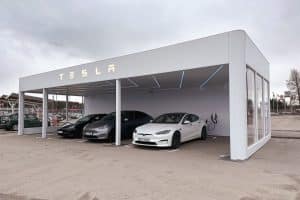Key Takeaways
- Multiple Tesla Supercharger stations in Massachusetts were intentionally set on fire, leading to an arson investigation.
- The Littleton Police Department and Massachusetts State Police are investigating the incident, determining it as intentionally set.
- Tesla plans to replace all damaged posts and wires at the affected station within 48 hours.
- The incident is associated with the Arson Watch Reward Program, which offers up to $5,000 for information related to solving or preventing arson crimes.
The electric vehicle (EV) sector has been on a transformative journey, with companies like Tesla leading the charge. However, recent events have highlighted challenges that could impact the industry’s progress. In Massachusetts, multiple Tesla Supercharger stations were intentionally set on fire, triggering an extensive arson investigation. This incident, alongside major shifts in global EV strategies from players like Tesla China, BYD, and Hyundai, paints a complex picture of the EV landscape.
A Fiery Incident: Tesla Supercharger Arson in Massachusetts
Recently, Tesla’s innovative Supercharger network faced an unusual threat. Several charging stations in Massachusetts were set ablaze, drawing attention to vulnerabilities within the infrastructure. The Littleton Police Department, alongside the Massachusetts State Police and the Fire Explosion Investigation Unit, is diligently working to uncover the perpetrator and the motives behind the act. The blaze, initially reported in The Point Shopping Center, has prompted heightened security measures at Tesla sites nationwide.
Key Points:
- Immediate Action: Tesla announced plans to replace all damaged infrastructure within 48 hours, ensuring minimal disruption to EV users.
- Community Involvement: The incident falls under the Arson Watch Reward Program, providing up to $5,000 for actionable information to solve or prevent such crimes.
Addressing the Ripple Effects
While Tesla grapples with localized disruptions, the company’s broader strategy faces challenges across the Atlantic. The transition to the new Model Y has led to a marked sales decline in China, signaling potential bumps in the road for Tesla’s global strategy.





